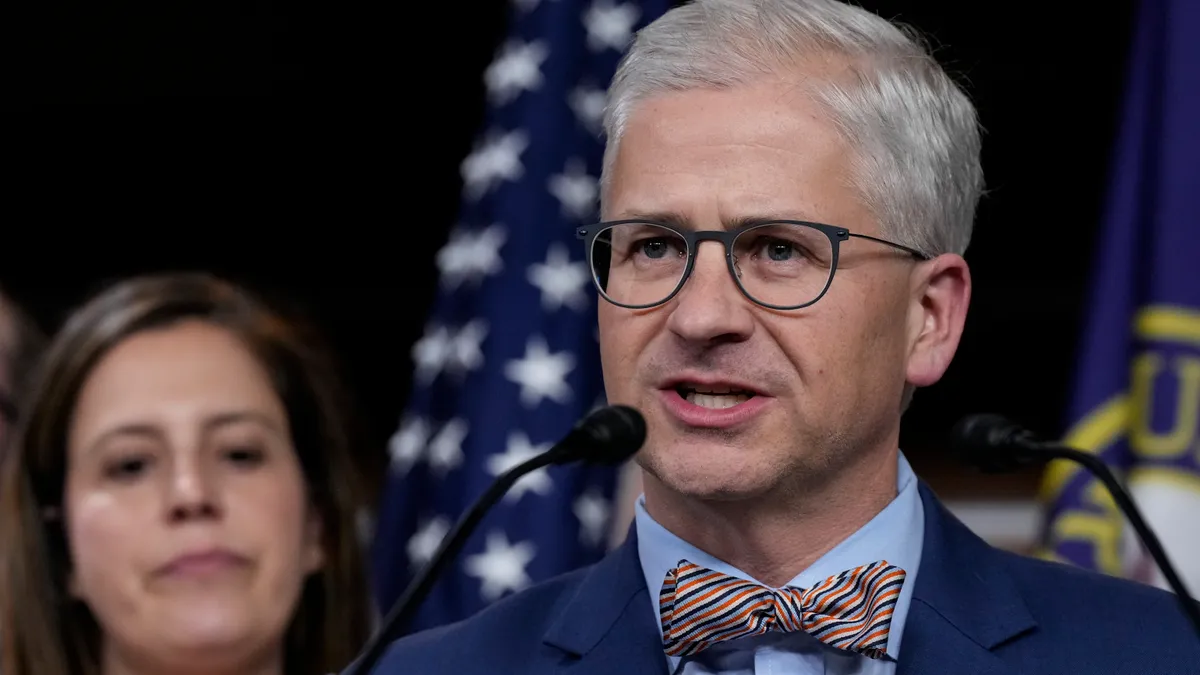Dive Brief:
- The House Financial Services Committee advanced a Congressional rebuke of the Securities and Exchange Commission’s climate-risk disclosure rule during a markup Wednesday, with a 28-22 vote split along Republican and Democratic party lines, respectively.
- The Congressional Review Act challenge to the SEC rule, finalized in March, was one of six joint resolutions of disapproval filed against Biden administration regulations that advanced out of the committee hearing. Also among those were challenges to rules for how large financial institutions should manage climate-related financial risk promulgated by the Federal Reserve, Federal Deposit Insurance Corporation and Office of the Comptroller of the Currency.
- The committee started the CRA process last week, when it held a hearing on the resolution. While multiple committee Democrats pushed back on the challenge during Tuesday’s markup, H.J. Res. 127 will now advance to consideration by the full House of Representatives.
Dive Insight:
The Financial Services Committee’s Republicans continue to lead the House GOP pushback against the agency’s climate disclosure rule. The committee hosted an “ESG Month” last July that included a markup on legislation to limit the SEC’s authority to compel climate-related disclosures and continued to question the agency’s authority on the rule both prior to and since its finalization.
During the hearing, GOP members of the committee expressed that they were not appeased by either the SEC’s elimination of scope 3 reporting requirements or the agency’s voluntary stay of the rule in the wake of multiple legal challenges. Committee Chair Patrick McHenry, a North Carolina Republican, said the House Republicans are “taking action to protect the American job market, the American stock market, job creators and workers and investors,” reiterating Tuesday that the agency’s stay was “not enough.”
“The fatally flawed rule exceeds the agency's authorities, threatens our economy and would overwhelm investors with non-economic information,” McHenry said in his opening statement. “It's costly, complex and against the public good.”
Oversight and Investigations Subcommittee Chair Bill Huizenga, a Michigan Republican, introduced the challenge and said the rule violates the major questions doctrine established by the Supreme Court in West Virginia v. EPA, as well as a recent ruling on another SEC rule in the Fifth Circuit. In the latter case, the court vacated a rule on share repurchase disclosure and held the agency violated the Administrative Procedure Act in failing to respond to petitioners comments and conduct a proper cost analysis.
“The SEC has strayed very far from its clear statutory mission,” Huizenga, whose subcommittee has held four hearings on the rule, said when introducing the resolution.
Financial Services Committee Ranking Member Maxine Waters decried the resolution at the markup. Waters, a California Democrat, said she “strongly” opposed the challenge “because it would deny investors material information about the companies they're invested in and how these companies are faring even as climate change and severe weather events worsen.”
“Climate change is real,” she said. “And its impact on the financial health of public and private companies is real. Investors have a right to know how the companies they own are impacted by this crisis and what they're doing in response to it.”
Prior to Wednesday’s hearing, a coalition of investor networks — including the American Sustainable Business Network, environmental nonprofit Ceres and the shareholder advocacy group the Interfaith Center on Corporate Responsibility — wrote to the leaders of the House and Senate asking them to oppose the resolution. McHenry and Waters were also sent copies of the letter, along with the chair and ranking member of the Senate Committee on Banking Housing and Urban Affairs.
The signatories collectively represent $50 trillion in assets under management and also include the Impact Investment Alliance, Seventh Generation Interfaith Incorporated and U.S. Sustainable Investment Forum, according to the letter.
“Investors want and need this valuable information to make informed investment choices and meet their fiduciary obligations to the people whose money and retirement savings they manage,” the coalition wrote.
The coalition strongly urged the lawmakers to reject the resolution in the letter, which was cited by Illinois Democrat Sean Casten during the hearing. Casten also referred to the results of Ceres’ 2022 analysis of institutional investors’ public comments. These 320 comments found 99% of institutional investors were in support of the agency requiring scope 1 and 2 disclosures while 95% were in support of requiring disclosure of existing climate-related targets and goals.
Following the vote, pro-ESG 501(c)4 Unlocking America’s Future spokesperson Kyle Herrig said in a statement that while the outcome wasn’t a surprise, it was “disappointing, as it squarely defies the demands of investors and the interests of the American public across partisan lines.”
“Opponents of the SEC’s climate risk disclosure rule doubled down on misinformation during the markup debate and made clear they will continue to ignore broad calls for support,” he said. “The SEC’s rule is an important step forward in standardizing climate risk reporting, which many companies are already voluntarily doing.”
UAF released a poll of 2,188 registered voters last week — conducted by Morning Consult — that found 85% of respondents who identify as Democrats and 60% of respondents who identify as Republicans believe companies should have to disclose climate-related risks. However, specific knowledge of the SEC rule is low, with just 5% of respondents who said they knew exactly what it is and half of respondents who had never heard of it.












